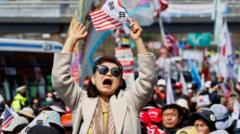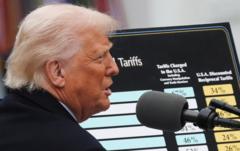The unanimous decision from South Korea's Constitutional Court to impeach President Yoon Suk Yeol showcases a significant shift in the nation's political dynamics, with calls for reform and a polarized populace.
South Korea's Presidential Impeachment: A New Chapter Begins

South Korea's Presidential Impeachment: A New Chapter Begins
South Korea's political landscape radically changes as President Yoon is impeached and removed from office.
In a historic ruling, South Korea's Constitutional Court has impeached President Yoon Suk Yeol, igniting intense reactions from supporters and critics alike across Seoul. The court's unanimous decision followed the president's controversial attempts to impose martial law, which shocked the nation and raised concerns about the revival of authoritarian practices.
Yoon, suspended from his duties since December, now faces the aftermath of a public deeply divided by his leadership. His brief military takeover in early December, which he justified by claiming it was necessary to combat “anti-state” sentiments, led to a swift political backlash, culminating in his impeachment by parliament.
On the streets of Seoul, crowds gathered in anticipation of the ruling, responding with a mixture of celebration and despair as the verdict was read. For many, this marked a new dawn for South Korea’s democracy and the chance to move on from the turmoil of Yoon's presidency. Acting president of the Constitutional Court, Moon Hyung-bae articulated the court’s disapproval of Yoon's actions, emphasizing that his military actions undermined the rule of law and the political rights of citizens.
Calls for constitutional reforms echo across the nation, aiming to prevent future power abuses by reducing presidential authority. However, experts warn that any such changes would require extraordinary political will – not a simple task considering the current political climate. South Korea finds itself more polarized than ever, as conspiracy theories and far-right sentiments gain traction among disillusioned citizens who see Yoon as a martyr wronged by the political establishment.
As the nation prepares for a snap election by June 3 to choose Yoon's successor, it faces a critical moment. With the public's faith in the political system waning – where more than a third question the legitimacy of the Constitutional Court and a quarter doubt the electoral process – the atmosphere is ripe with uncertainty.
In the background looms international tensions, particularly with the United States under President Trump's administration, which have already placed South Korea's economy under strain. The dual pressures of domestic unrest and foreign relations demand an adept leader capable of unifying a fractured nation.
While Yoon's legal team contemplates their next move, claiming political bias in the ruling, the opportunities for reconciliation may hinge entirely on the leadership that emerges next. The nation now stands at a crossroads, yearning for direction and stability amidst its cries for unity and a return to democratic integrity.

















